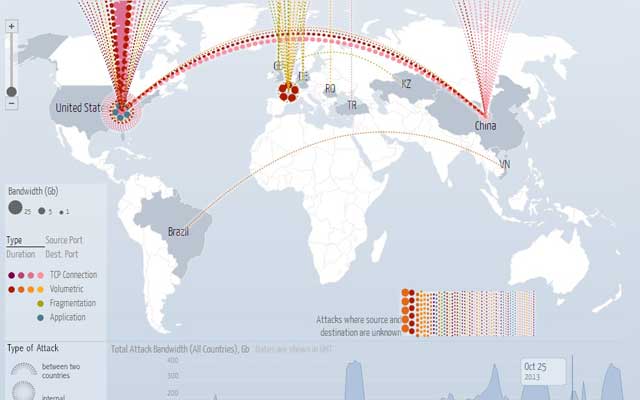Google’s new Digital Attack Map reveals that the U.S. experiences daily cyber attacks. Though much of the map’s real-time cyber activity is untraceable, the map does confirm that China heavily targets the U.S. This underscores the need for the U.S. to make China feel a cost for its cyber espionage and theft.
Earlier this year, the cybersecurity firm Mandiant reported that the People’s Liberation Army (PLA) has stolen hundreds of terabytes of information from over 140 U.S. organizations. Also earlier this year, the Commission on the Theft of American Intellectual Property reported that the U.S. loses $300 billion per year from cyber espionage, chiefly from China. This doesn’t even begin to calculate the national security risks the U.S. faces.
Beyond threatening other nations, China’s cyber activities are also directed toward maintaining domestic control using the “Great Firewall” to censor online access and content. In fact, cyber actors within China targeted the personal email accounts of human rights activists in China, the U.S., and Europe. News of this latest breach drove Google to end its cooperation with Beijing, believing that China’s cyber exploitation cannot coexist with business security, private-sector profits, economic progress, or global Internet freedom.
Apart from securing its own cyber networks with essential legislation—focusing on supply chain security and private-public information sharing—the U.S. should turn from its current ambivalence and advance its cybersecurity internationally. Partnering with friends from around the globe would allow the U.S. to lead the struggle for Internet freedom and make cybercrime too economically and politically costly to continue.
The U.S. already possesses extensive formal, legal, and working relationships in Asia, and it should use these relationships to advance a full spectrum of responses to Chinese cyber incursions meant to punish and discourage hackers. For example, just as Google’s current project, uProxy, will bypass filtering services and online surveillance, so too the U.S. government ought to retaliate against cyber theft by enabling Chinese citizens to bypass the Communist regime’s domestic Internet controls.
Authoritarian regimes predicate their power on control over their populations. Retaliating against cyber theft in this manner will hopefully make the Communist leadership and the PLA think twice about continuing to target U.S. businesses.
The U.S. can no longer ignore the status quo of state-sponsored cyber theft by the Chinese and others. By enabling domestic reforms, partnering with private industry, and being an international leader on cyber issues, the U.S. government can protect American property, promote freedom, and strengthen U.S. national security.
Brett Ramsay is currently a member of the Young Leaders Program at The Heritage Foundation. For more information on interning at Heritage, please click here.
The post Cyber Attacks: Hopping the "Great Firewall" appeared first on The Foundry: Conservative Policy News Blog from The Heritage Foundation.
